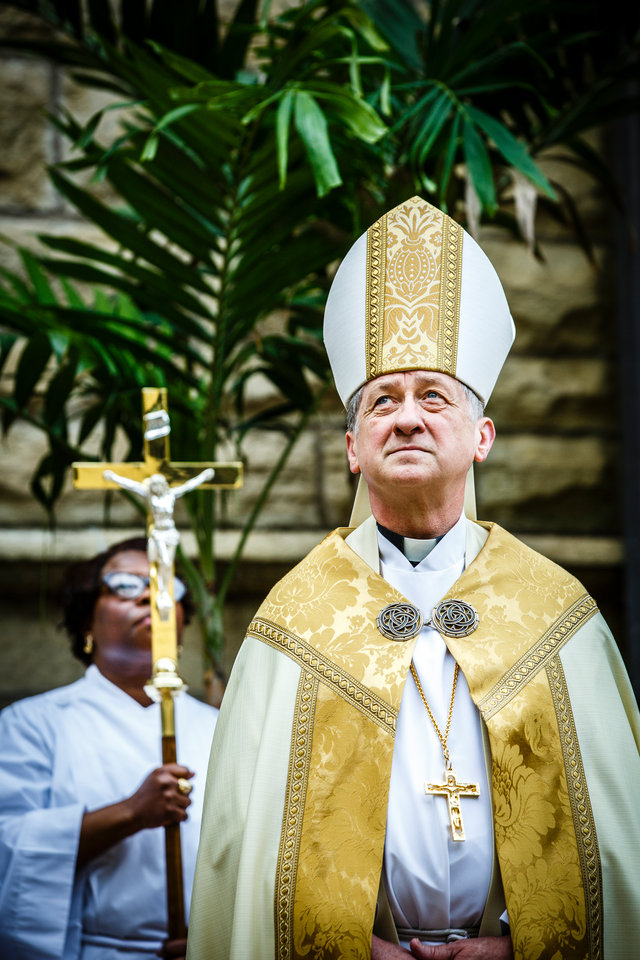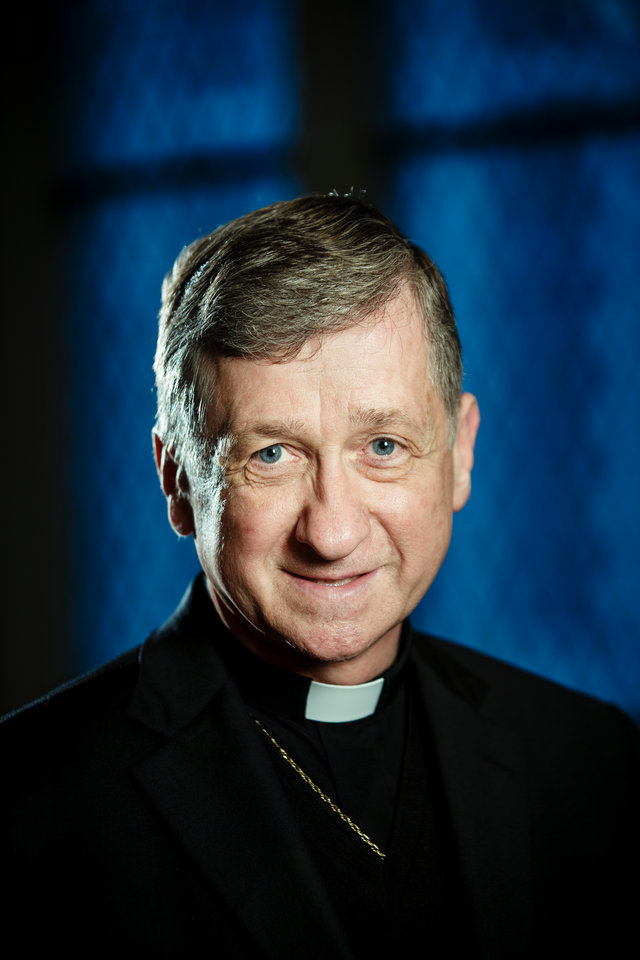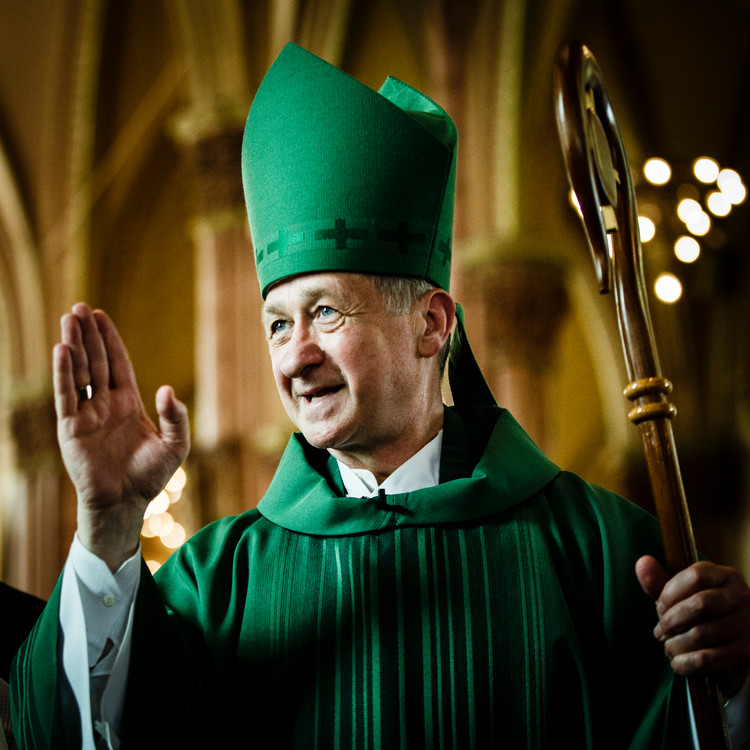CHICAGO – The ceremony to bless and dedicate the renovated courtyard at Holy Name Cathedral was wrapping up on a humid June Sunday afternoon when a man approached the platform and handed a gift bag to Chicago Archbishop Blase Cupich.
He pulled out a Chicago Blackhawks jersey, held it up to the crowd of 150 and they cheered. Then he flipped the jersey to show the back. It read “Cupich” across the shoulders, with “1” beneath his name. The cheers became louder, and he simply responded, “Awesome!”
The significance of the moment was not lost on anyone. The evening before, the Blackhawks had won a playoff game over the Tampa Bay Lightning to take a 3-2 lead in the Stanley Cup finals. When they won the championship the next evening, the team was as popular in Chicago as the man who has led the archdiocese’s 2.2 million Catholics since his arrival last November.
 The jersey came from Phil Stefani, owner of 14 restaurants in the Chicago area, and was meant to convey the sentiments of both his business and the community at large. Stefani took Cupich to two playoff games and appreciates what the archbishop has done for the city.
The jersey came from Phil Stefani, owner of 14 restaurants in the Chicago area, and was meant to convey the sentiments of both his business and the community at large. Stefani took Cupich to two playoff games and appreciates what the archbishop has done for the city.
“I thought it was an appropriate gift even though I don’t expect him to wear it around town like the million other people who have Blackhawks jerseys,” Stefani said. “But I’ll make sure he wears it next season when we go to a Blackhawks game!”
It helped that Cupich (pronounced sue-pitch) likes sports and is a generous winner. He bet with St. Petersburg Bishop Robert Lynch on the outcome of the Stanley Cup, with Chicago deep-dish pizzas and Florida grapefruit at stake. Lynch lost and shipped cases of grapefruit to a Catholic Charities ministry for veterans in Chicago. Cupich? He still sent 180 pizzas to a Florida homeless shelter.
“All of Chicago is offering a prayer of gratitude today,” the 1971 St. Thomas alumnus said. “The city is celebrating and we want to include our friends in Florida in that celebration.”
Gratitude. Inclusion. Celebration. They were not just words spoken in the giddy aftermath of a championship. They also are words that characterize the leader of the nation’s third-largest archdiocese as he transitions from having served for 17 years as the bishop of two small dioceses – first Rapid City, South Dakota (30,000 Catholics), and then Spokane, Washington (90,000).
“Chicago is more complex,” Cupich said, “but I don’t think the challenges here are ones that I didn’t have in Rapid City or Spokane. It’s all a matter of bringing together the right people to address issues. I don’t have all the answers, but I do have the right people to ask questions and help me find answers.”
Cupich succeeded legendary cardinals Francis George and Joseph Bernardin – leaders who Catholics and the media around the country often sought for commentary. Cupich won’t call himself a “thought leader” so early in his tenure.
“I always ask if what I say is true,” he said. “Then you have to ask yourself, ‘Does it have to be said, and now?’ And finally, ‘Am I the right person to say it?’ I might not be. I don’t want to speak on an issue in reaction or to get attention. I want to be strategic and to ask, ‘What’s the overall goal?’”
Blase Cupich was born March 19, 1949, in Omaha. His parents named him for his father and grandfather, a Croatian immigrant, and all were christened in honor of St. Blaise, the patron saint of Dubrovnik, Croatia. (Pride in his ancestral homeland remains with the archbishop, whose coat of arms includes crossed candles for the blessing of throats on the Feast Day of St. Blaise.)
The third of nine children of a postal worker and a homemaker, Cupich picked up odd jobs that helped to support the family. He also was expected “to take a leadership position in the home,” which he grew to like “because it gave us a sense of responsibility for each other. In a family that size, you had to learn how to negotiate relationships. You were not the center of the universe, and they would knock you down a peg or two if you got too big for your britches.”
His father encouraged him and his siblings to consider a religious vocation, but he was uncertain for a long time. He spent two years at Mount Michael Abbey, a minor seminary near Omaha, before enrolling at St. Thomas and St. John Vianney Seminary in 1969.
 Cupich called his two years at SJV invaluable “because it tested me on the whole notion of my vocation.” He graduated with a bachelor’s degree in philosophy, and the archbishop of Omaha wanted to send him to the North American College and Gregorian University in Rome for further studies. “I said I was not ready to sign on the dotted line,” Cupich recalled, “and he said, ‘Fine. We’re not ready to ordain you, either.’”
Cupich called his two years at SJV invaluable “because it tested me on the whole notion of my vocation.” He graduated with a bachelor’s degree in philosophy, and the archbishop of Omaha wanted to send him to the North American College and Gregorian University in Rome for further studies. “I said I was not ready to sign on the dotted line,” Cupich recalled, “and he said, ‘Fine. We’re not ready to ordain you, either.’”
As he prepared for his third year in Rome and ordination as a deacon, Cupich knew he had to make a decision on the priesthood.
“It seemed a good fit,” he said. “I liked what priests did. I thought I could do it and be happy. That’s always a question a seminarian has to ask: Can I embrace it and be happy?”
Cupich was ordained a priest for the Archdiocese of Omaha on Aug. 16, 1975, served at a local parish and taught at a Catholic high school. He later worked in an archdiocesan office and taught at Creighton University before he was appointed – in 1981 at age 32 – as secretary of the Apostolic Nunciature, the pope’s diplomatic mission in Washington, D.C.
After six years, he returned to Omaha as a pastor before serving as president and rector of the Pontifical College Josephinum, a seminary in Columbus, Ohio, from 1989 to 1996. He returned again to Omaha as a pastor before he received a phone call in 1998 that Pope John Paul II would appoint him bishop of Rapid City, South Dakota.
“It was shocking to me,” he said. “I loved my parish, and becoming a bishop was not on my radar screen. It came out of the blue, and I just had to go with the flow. I have never asked for anything (as a priest), and I have never refused anything.”
His ordination as bishop was memorable. The Most Rev. Harry Flynn, who had become archbishop in St. Paul three years earlier, traveled to Rapid City to perform his first episcopal ordination.
“When the time came for the pouring of chrism on my head, he (Flynn) focused his attention on the book, as he read the prayer,” Cupich recalled earlier this year in a Chrism Mass homily. “The MC handed him the oil, which he had prepared in a liter bottle, filled to the brim. The archbishop poured as he read, and poured as he read some more, emptying the entire flask, drenching me in chrism. As I stood, the oil flowed over my entire body, reaching clear down to – well, my shoes.”
Flynn vouched for Cupich’s version of the story.
“It’s absolutely true!” Flynn said. “It’s so true that the next time I ordained a bishop, in Duluth, he made sure I didn’t have that much oil – just a small jar – because he heard what happened to Bishop Cupich. It’s amazing he didn’t drown.”
Life in rural South Dakota and the Black Hills was strikingly different from Omaha. Cupich’s parishes were spread out over 42,000 square miles of western South Dakota, with only 30 diocesan priests. During his 12 years, he incorporated Lakota rituals into liturgies, and the Lakota thought so highly of him that they named him Wakinya Ska (White Thunder).
“It really was an honor to be given a name and to be part of the naming ceremony,” he said. “I came into the circle of their family. It’s a clannish thing, and it goes as far back as the time of Sitting Bull.”
Pope Benedict XVI named Cupich as bishop of Spokane in 2010, and during his fifth year there he received another phone call and another appointment from another pope. Francis wanted him in Chicago. Church observers called it the pope’s first major appointment in the United States.

Cupich delivers a homily at Holy Name Cathedral in Chicago.
“The Francis revolution in Catholicism has finally arrived in the United States,” religion writer John Allen Jr. wrote in an analysis for Crux, an online magazine. “Up to this point, one could have made the argument that the change triggered by Francis is largely a matter of a new tone and style in Rome, but one that had not yet reached down and begun to alter the culture of the church on these shores. With the (Cupich) appointment, however, the American landscape has shifted.”
John Carr, a 1972 St. Thomas alumnus and director of the Initiative on Catholic Social Thought and Public Life at Georgetown University, said that while his fellow SJV alumnus may have been an unconventional choice, he should not have been a surprising one.
“Archbishop Cupich is the Francis factor come to Chicago,” Carr told the Chicago Tribune. “He is like Pope Francis in his humble ways. He has a clear priority for the poor and his ministry of both joy and mercy. This was not a business-as-usual appointment.”
Ten months later, Carr had a different take on whether Cupich is a Francis “clone,” as some say.
“Blase is a remarkable example of a Francis bishop before there was a Francis,” Carr said. “In Rapid City and Spokane, he was a bishop who listened and learned, and usually those things don’t come together. He is confident but not arrogant, humble but not passive. He has great integrity. And when everyone is moving in one direction and he wonders if it’s the right direction, he’ll stand up and say, ‘We should talk about this.’”
Carr paused to add another “L” to his list of Cupich attributes. “He’ll succeed,” Carr said, “because he listens, learns and leads.”
Sister Katarina Schuth, OSF, who holds an endowed chair for the social scientific study of religion at the Saint Paul Seminary School of Divinity, values Cupich’s pastoral nature. She was a consultant to him in Rapid City, and she recalled her answer when a foundation asked her to name the best bishop in the United States: “I said Blase Cupich. He is a humble man, he trusts people, he shows compassion, he has a delightful self-deprecating sense of humor and he always thanks people.”
Cupich doesn’t believe the Vatican was sending a message by moving him to Chicago. While he realizes he may have been an unexpected choice, given his leadership of two small dioceses, he points out that his breadth of experience has prepared him well. He greatly admires Pope Francis and believes he is popular because of his “authenticity” and how people of all faiths agree with his emphasis on social justice and how priests should be “shepherds living with the smell of the sheep.” But does Cupich believe he is the “Francis factor” in American Catholicism?
“Let history define that,” he said. “The pope doesn’t want a replica of himself in Chicago. He saw things he wanted done here. He didn’t choose me because I was going to imitate what he’s doing. I am doing the job as I think it should be done.
“I have been saying the same things for 10, 15 years. I am not lip-syncing the pope. I have a record. Francis helps in giving me a bigger megaphone in speaking about the things that I care about. But I am not going to calibrate what I say any differently because Francis is our pope.”
In his nearly one year as archbishop in Chicago, Cupich has focused on learning about the sprawling archdiocese with 350 parishes, 244 schools, 17 hospitals and a Catholic Charities operation that provides services in 160 locations. He noted in June that he already had received 50 requests for speeches outside the archdiocese but had accepted only two, including the commencement address at Boston College in May.
His philosophy and his wit were on display that day. He told graduates that trust in God “will sustain you in moments of doubt about your future” and he encouraged them to keep “fresh a sense that grace … is the pathway to living a truly free, authentic and rewarding life.” Such grace, he suggested, “will help you become the leaders we need today” to promote the common good.
“The human person proposed to you here is one who seeks and claims an integral development, morally, spiritually, intellectually and emotionally, which is joined intrinsically to the communities that sustain you,” he said. “They have helped you cultivate your Godgiven sensibility of the grace of life and an understanding of the great command of Jesus: ‘Love one another as I have loved you.’”
Cupich also told the story of his niece Emily, who had received her college degree a week earlier. She was a kindergartener when he was ordained the bishop of Rapid City, and she asked him for 15 of the prayer cards prepared for the occasion. She planned to share them in school.
“Emily began her ‘show-and-tell’ performance by handing out my photo to her little kindergarten buddies,” Cupich said, “and then she asked them to guess what I was. Very quickly, those fertile little 5-year-old minds came to a consensus: I am a ninja warrior! ‘Well,’ my sister told me, ‘it could have been worse; you could have been a Pokemon.’”
 At the end of his Boston College remarks, Cupich asked graduates to sit down with 5-year-olds like Emily and teach them new songs. “Delight in her perceptiveness,” Cupich said. “Marvel at her readiness to receive a new grace, and then be ready yourself to find new hope. For in all of this it will dawn on you that this child will always remember you as the person who taught a new song.
At the end of his Boston College remarks, Cupich asked graduates to sit down with 5-year-olds like Emily and teach them new songs. “Delight in her perceptiveness,” Cupich said. “Marvel at her readiness to receive a new grace, and then be ready yourself to find new hope. For in all of this it will dawn on you that this child will always remember you as the person who taught a new song.
“And finally,” he added, “do me a favor. Since I’m relatively new to Chicago, and the people and especially the priests have not quite figured me out yet, let’s keep that business about being a ninja warrior between us.”
Cupich is not reluctant to use both the pulpit and speeches to make clear his positions. At an economics conference in April, he spoke about Catholic social justice as articulated by Pope Leo XIII in his 1891 encyclical, Rerum Novarum, and more recently by Pope Francis.
Cupich warned how “a pervasive materialism fuels a frantic consumerism” and lamented how government safety nets are “being pulled apart.” He also insisted that immigration reform “is not just about the people who are undocumented, but about the moral values of a nation which uses their labor and other contributions to its benefit without offering them the protection of law.”
Mercy is another common theme. He has quoted St. Thomas Aquinas’ saying that mercy is the greatest virtue because others revolve around it, and during a Holy Name Cathedral Mass in June he challenged the congregation to embrace God’s mercy. “Move us to share that flame which his heart could not contain,” he said, “so we may show mercy and love beyond our comprehension.”
In June, his response to the U.S. Supreme Court decision ruling in favor of same-sex marriage had a significantly different tone than that of the U.S. Conference of Catholic Bishops president, who criticized the ruling as “profoundly immoral and unjust.” Cupich pointed out the court had redefined civil marriage – not the Catholic sacrament of matrimony – and said the church’s catechism emphasizes the need for respect and compassion to the LGBT community.
Cupich’s statement also said that despite concerns the court’s separate decision upholding the Affordable Care Act violates religious freedom, it “preserves access to health care … for millions of individuals and families, most of them the working poor.”
The archbishop’s message seems to be playing well. Manya Brachear Pashman, the Chicago Tribune religion writer, finds him serious but witty and likes how he calls on reporters by their first name during news conferences. She was surprised he took two days to respond to the same-sex marriage ruling, “but he told me, ‘I just wanted to take my time and to be clear on what I wanted to say.’ It was a thoughtful rationale on a sensitive issue.”
Neither Flynn nor Carr have any doubts that Cupich will succeed. His pride in his Croatian heritage resonates in a city where many ethnic communities remain, Carr said, and advocacy for the rights of immigrants will win him their support. Flynn simply calls him “one of the most intelligent and insightful men in the American church.”
Stefani, the jersey-giving restaurateur, likes how Cupich is a man of the people.
“The two games I brought him to, I couldn’t believe the number of people who went up to him to say hi,” Stefani said. “He gives a feeling to everybody that ‘Hey, I’m just like you.’ For our city at this time, he’s the right guy to lead us.”
Even if he doesn’t wear his Blackhawks jersey around town.
Read more from St. Thomas magazine.







